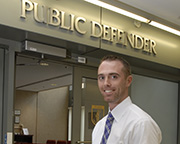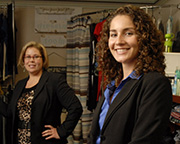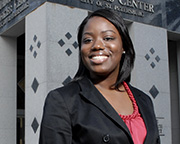
FAQ - Clinics and Externships
The Basics
- What is an Externship?
- What is a Clinic?
- What Is the Difference?
- Who Can Participate?
- How do I Apply?
- What Will Hurt My Chances of Being Selected?
- What Is a clinic or externship cover letter?
- How Are Students Selected?
- How Are Students Notified of Their Selection?
- Can I Be Denied Participation, Even If I Meet the Minimum Requirements?
- May I Appeal If I am Not Selected?
- May I Reapply If I am Not Selected?
- Do I have to Do Anything Besides Apply
- Background Checks
- Certification
- What Are the Hourly Requirements?
- How Many Credits Can Be Earned?
- Are Clinics or Externships Paid?
- Can I Receive Pro Bono Hours for My Clinic or Externship Work?
- Can I participate in More Than One Program?
- Do Rules of Confidentiality Apply to Clinic and Externships?
- How Do I Handle a Problem at My Clinic or Externship?
- How Can I get the Most Out of My Clinic or Externship Experience?
- How Do I Upload Transcripts?
What Is an Externship?Top
Externship programs place students in off-campus, legal environments where they observe and participate in the activities of host organizations. Externship placements vary widely and include state and federal courts, governmental agencies, and local corporations. Consequently, students enjoy the unique opportunity of observing how these entities operate from behind the scenes. Students routinely perform functions such as reviewing documents, conducting research, and writing memoranda of law.
What Is a Clinic?Top
Most clinic programs place students in off-campus, legal environments where they are authorized to practice law under the supervision of a licensed attorney. Off-campus clinic placements include legal aid organizations, local governments, the Office of the Public Defender, and the Office of the State Attorney. Stetson currently has two on-campus clinics, the Veterans Advocacy Clinic and the Dick and Joan Jacobs Public Interest Law Clinic for Democracy and the Environment. Students routinely conduct research, interview clients and witnesses, write motions or memoranda of law, and advocate during hearings and trials. Students will be awarded 30 legal public service hours for completion of a clinic. These hours will be credited toward the Pro bono/Public Service graduation requirement but will not be counted toward the Blews Award (which is reserved for pure Pro Bono service).
What Is the Difference?Top
In general, students participating in clinic programs are approved by the Florida Supreme Court as Certified Legal Interns (CLIs). CLIs are authorized to practice law under the supervision of a licensed attorney. Consequently, CLIs may speak in open court. Speaking in open court often includes arguing motions and advocating during criminal proceedings, including jury trials. Although, participation in a clinic program generally requires approval as a CLI, there are exceptions--most notably, participants in the Immigration Law Clinic, and Veterans Advocacy Clinic are not required to be CLIs.
Who Can Participate?Top
Although eligibility requirements vary, all programs require that students be in good academic standing at the College of Law. For externship programs, students must have successfully completed all first-year requirements. For clinic programs requiring a CLI clearance, students must have successfully completed at least four semesters and 48 academic credit hours, including Professional Responsibility. Honor code, conduct code, and criminal cases can impact a student's eligibility to participate in programs. For a detailed listing of the eligibility requirements for each program, see the Program Outlines.
How Do I Apply?Top
Students apply for clinic and externship programs online. The application process for spring programs is conducted during the preceding fall semester and application for summer and fall programs is made during the preceding spring semester. Application procedures and submission deadlines can be found at How to Apply.
Students are encouraged to apply for all programs they are genuinely interested in and are instructed to numerically rank their preferences. However, students should only apply for programs to which they are willing to be assigned, regardless of how high or low the selection may be ranked. Additionally, some programs allow students to indicate their preference of placement locations (i.e., hosting organizations) while other programs do not. When solicited, students' preferences are taken into consideration by overseeing professors when making assignments, but are not guaranteed.
What Will Hurt My Chances of Being Selected?Top
Four things will definitely hurt your chances of being selected. First, do not miss the deadline. The online application system will not accept applications after the deadline. Therefore, don't wait until the last minute to submit your application--allow time for the unexpected. Second, be sure to provide all requested information and include all required attachments. Incomplete applications will most likely be discarded. Third, do not attempt to lobby for placement in a clinic or Externship program through recommendations from judges, faculty, alumni, etc. Overseeing professors will not consider outside recommendations and discourage such efforts. Fourth, provide thoughtful reasons for wishing to participate in a particular program, as glib or cursory reasons will negatively impact your chances of being selected. (See "What is the Cover Letter?" section below.)
What Is a clinic or externship cover letter?Top
A clinic or externship cover letter is a short statement describing the student's rationale for desiring placement in a particular program addressed to the overseeing professor. If it has been a student's life-long dream to be a defense attorney ever since he or she read To Kill a Mockingbird, the student should definitely mention this in his or her statement of interest for the Public Defender Clinic. Yet, even if a student has no idea what he or she wants to do after law school, but believes that a particular clinic or Externship experience might help the student decide, it is perfectly acceptable to state this as a reason for desiring placement in a particular program. Students should be honest about their motivations, but avoid making statements that would lead a reasonable person (i.e., the overseeing professor for the program to which they are applying) to believe that the student's interest in the program is insufficient to motivate the student to do his or her best. Students should submit a cover letter for each program to which they apply. Letters need not be lengthy -a single page will suffice. Please refer to the Office of Career and Professional Development's cover letter toolkit for specifics on formatting.
How Are Students Selected?Top
Most students are selected for placement by the program's overseeing professor based upon factors such as student preference, GPA, performance in relevant coursework, evidence of interest, background, past participation in a clinic or externship, and graduation date. However, for some programs, such as the United States Court of Appeals for Veterans Claims Externship, students are selected by the court after interviewing with a judge. See the Application Requirements section of the Program Outlines for specific information on each program.
How Are Students Notified of Their Selection?Top
Students are notified of their selection for participation in a clinic or externship program, via email. If applicable, the email will also include instructions for complying with the program's background check or certification requirement.
Can I Be Denied Participation, Even If I Meet the Minimum Requirements?Top
Yes. Some programs have limited openings and are highly competitive, while others have many openings and are less competitive. Furthermore, some hosting organizations review applicant files and occasionally decline to accept a particular applicant. Meeting the minimum requirements does not guarantee a student's acceptance, only that he or she will be considered for placement. Lest this seem discouraging, understand that Stetson places the vast majority of students into a program of their choice, even if it is not their first choice.
May I Appeal If I am Not Selected?Top
No. Selection decisions are final and may not be appealed. Each semester, the volume of applications necessarily results in some highly qualified applicants not being placed. Selection decisions are made by each program's overseeing professor, based upon the relative qualification of the total applicant pool. Overseeing professors are prohibited from discussing the specific qualifications of other applicants. Do not under any circumstances ask to discuss the specific qualifications of other applicants.
May I Reapply If I am Not Selected?Top
Yes. Although every effort is made to place students in a program of their choice, it is not possible to accommodate every student. Students are permitted and encouraged to reapply for participation during subsequent semesters.
Do I Have to Do Anything Besides Apply?Top
Often, yes. Most programs require that students pass some form of background check or be certified by the Florida Supreme Court before participating. A few programs also require a personal interview as part of the application and selection process. See the subsections below as well as the Program Outlines for more details.
Background ChecksTop
Most externship programs require students to pass some form of background check before they may participate. Some background checks are conducted based upon the information provided in the student's initial application; others require additional documentation. As requirements vary, students should refer to the Program Outlines to learn more about each program's background check requirements.
Note: Participation in any program that requires a background check is contingent upon satisfying this requirement. Any student who fails to pass a background check will be prohibited from participating in the program.
CertificationTop
Most clinic programs require students to be certified by the Florida Supreme Court before participation. The process for obtaining certification is as follows:
The student submits either a Student Registration or Certified Legal Intern Registration to The Florida Board of Bar Examiners. If there is any chance that the student will practice in Florida, The Florida Board of Bar Examiners recommends submitting a Student Registration.
- The Florida Board of Bar Examiners will conduct an investigation into the student's character and fitness. On average, this process takes 6 to 8 months and may require the student to submit additional information. Although the process is sometimes completed in less than 6 months, it can also take considerably longer.
- If The Florida Board of Bar Examiners determines that there is nothing in the applicant's background that would necessarily preclude admission to The Florida Bar, it will issue a letter of approval to the applicant. The letter of approval is also sometimes referred to as a "letter of clearance" or a "notice of registrant clearance."
- Ideally, the student will have received his or her letter of approval prior to applying to participate in a clinic program. If so, the student should be prepared to submit a copy (keep the original) upon request. However, if a student has not yet received his or her letter of clearance at the time of applying for a clinic program, but expects to receive it at least two months prior to participating in a clinic, the student may still apply.
- Upon being provisionally placed in a clinic program that requires certification, the student will be instructed to submit a completed Application for Certification Under the Student Practice Rule of The Florida Bar. The student will be provided with a copy of this document.
- Stetson Law will forward the Application for Certification, the student's letter of approval, and a letter from the Dean of Stetson Law to the Florida Supreme Court.
- The Florida Supreme Court will issue a letter to the Stetson Law designating qualified students as Certified Legal Interns.
Note: Students are strongly encouraged to submit a Student Registration or Certified Legal Intern Registration during their first year of law school. Students who fail to initiate the certification process early run a significant risk that it will not be completed in time for them to participate in a clinic program. Do not miss out on such valuable opportunities. Register early!
What Are the Hourly Requirements?Top
Almost all clinic and externship programs have an hourly requirement that students must meet in order to receive academic credit. Hourly requirements are set by each program's overseeing professor and are included in the Program Outlines. Students should note that the stated hourly requirements represent the minimum number of hours students must work to receive credit. Students are encouraged to devote as much time as possible to their clinic or externship program to maximize the benefits they derive from the experience. Procedures for reporting hours will be communicated to participating students by each program's overseeing professor.
How Are Programs Graded?Top
All clinic and externship programs are graded on a S+, S, S-, or U basis. Generally, grades are assigned by each program's overseeing professor with input from each student's on-site supervisor. However, for some judicial programs, grades are determined by the overseeing judge. Clinics and externships provide students with important opportunities to gain valuable, real-world experience and represent a significant step in the student's legal education. Furthermore, the interaction between students and the legal community that results from these programs has a significant impact on Stetson's reputation within the legal community. Consequently, students are required to demonstrate a commitment to hard work, professionalism, and conscientious adherence to the code of legal ethics at all times. Anything less will result in a grade of U and the student will be disqualified from further participation in clinics or Externships.
How Many Credits Can Be Earned?Top
Students generally earn three to five credits for externship programs. However, some externship programs are worth twelve credits. Most clinic programs award five credits. Check the Program Outlines for specific, credit-related information on each program. Additionally, students should familiarize themselves with the College of Law's policy on the minimum number of classroom credits required for graduation. (Most externships and clinic programs do not count toward the required classroom hours.) This policy is available through the Registrar's Office.
Are Clinics or Externships Paid?Top
No. Although the American Bar Association has removed its specific prohibition on law schools from awarding credit for work performed by students who receive compensation for their activities, the College of Law policy remains that credit will not be granted for work performed by students who receive compensation for those activities. The ABA does allow students to receive reimbursement for nominal expenses. However, the College of Law does not provide reimbursements. Before incurring such expenses, check with the agency to find out if they will reimburse you.
Can I Receive Pro Bono Hours for My Clinic or Externship Work?Top
Yes. Students who are in a clinic will receive 30 hours of public service credit which will satisfy the legal pro bono graduation requirement if the student completes the clinic with a passing grade. Those hours will not be posted on the pro bono Engage software but will be counted as part of the graduation audit.
Students may earn pro bono credit for work conducted for a public interest or public service office or agency hosting an extern, if those hours were worked before or after the semester during which the student was enrolled in the clinic or externship. Please see the recorded lecture to understand the policies in more detail.
Can I Participate in More Than One Program?Top
Yes. Students may participate in multiple clinic and externship programs during their law school career, but may only participate in one program per semester and generally may only participate in a particular program one time. However, at the discretion of the overseeing professor, students may occasionally repeat a program when the subsequent placement would be substantially different from the student's initial experience.
Do Rules of Confidentiality Apply to Clinics and Externships?Top
Absolutely. Students who participate in clinic and externship programs have a duty to comply with the requirements of client confidentially and may not share confidential information with unauthorized individuals. Students must ensure that they are familiar with the Florida Rules of Professional Conduct, especially Rule 4-16.
How Do I Handle a Problem at My Clinic or Externship?Top
If the problem is serious, such as one that threatens student safety or involves unlawful or unethical conduct or violates any of Stetson's policies, you should inform your overseeing professor and the Associate Dean of Academics immediately. (Obviously, if there is an imminent threat your safety, you should call 911 immediately). In such situations, the overseeing professor will determine and initiate an appropriate response to the problem.
If the problem is minor, such as the typical friction among co-workers that can occur in most work settings, you should try to constructively address the situation yourself. Your overseeing professor is available to offer advice in this regard. Even if you feel comfortable handling the situation, remember that you should still let your overseeing professor know about the situation. Because overseeing professors need to be kept apprised of the conditions under which our students are working, you should report even minor problems to your overseeing professor.
How Can I Get the Most Out of My Clinic or Externship Experience?Top
One of the most important things to remember is that attitude is everything. Clinics and externships provide students with excellent opportunities to learn how the law works in a variety of real-world settings. Students benefit greatly from this experience and, ideally, hosting organizations realize a benefit from the assistance of hardworking students. Thus, clinic and Externship programs represent a win-win situation for both parties.
However, students should remember that hosting organizations do not exist solely for the benefit of students. Occasionally, supervising attorneys are so occupied by their primary duties that they cannot provide students with constant supervision or immediate feedback and sometimes students run out of things to do. The same thing can happen to entry-level attorneys, and it is important to be able to exercise initiative and find something to do.
If you run out of things to do, ask your supervisor if it is okay to solicit work from other attorneys. (In fact, it is a good idea to ask this at the beginning of your clinic/externship.) If you have trouble getting work from attorneys, ask the secretaries what you can do to help. It is important to be assertive without being obnoxious. As each environment is different, it will be up to you to determine what it takes to work well with the people in your office.
In addition to demonstrating initiative, students should carefully listen to instructions, perform each task to the best of their abilities, and not be afraid to ask for guidance after unsuccessfully attempting to figure something out. Above all, be professional and courteous at all times.
How Do I Upload Transcripts?Top
(1) Go to myStetson and sign in; (2) click through to the Academic Transcript page; (3) once on that page, there are two pull down boxes that are defaulted to "All Levels" and "Deland Unofficial" and these must be changed to "Law" and "Law Sch Transcript w/Rank" prior to pressing submit; (4) print this page to .pdf format by choosing Adobe PDF as the printer type (if you do not have this printer option, IT can install it for you). Save your PDF, and upload to the application. Do not (a) print and scan your transcript (it won't look good and the file size may be too large), (b) copy and paste your transcript into a Word document (it really won't look good), or (c) pay for a copy of your unofficial transcript from the Registrar's Office and scan it (the file size will be too large).

Greg Barton
Student participant in Public Defender Clinic
"Participating in the clinic has allowed me to actually practice law. There isn't a substitute for that. It's an invaluable learning experience in that it allows you to get a trial run on your future profession, and it opens your eyes to what you like, questions you might have, and things you never thought of before."

Victoria Chiaramonte
Student participant in Child Advocacy Clinic
"The most beneficial aspect of the clinic was having attorneys in the office who were patient and willing to teach me, and having a supervising attorney who was there to correct me, encourage me and show me how to be a better advocate."

Lakeisha Simms
Student participant in Local Government Clinic
"A typical day included meeting with different assistant city attorneys to determine what issues the attorneys needed help with. I would then research the issues and write memoranda or charts to help the attorney convey the answer to the various city departments needing help. The clinic program is the ideal way to practice the skills you learn in the classroom and get feedback from practicing attorneys. It is also a great way to test whether you will enjoy a particular practice area."

Charles Near
Student participant in Prosecution Clinic
"The clinic program prepares you in ways that other experiences cannot. It allows for students to receive actual courtroom experience by arguing in front of judges and juries. I feel at home in a courtroom and comfortable working with witnesses. I would not feel this way if Stetson had not given me opportunities to work in these venues."